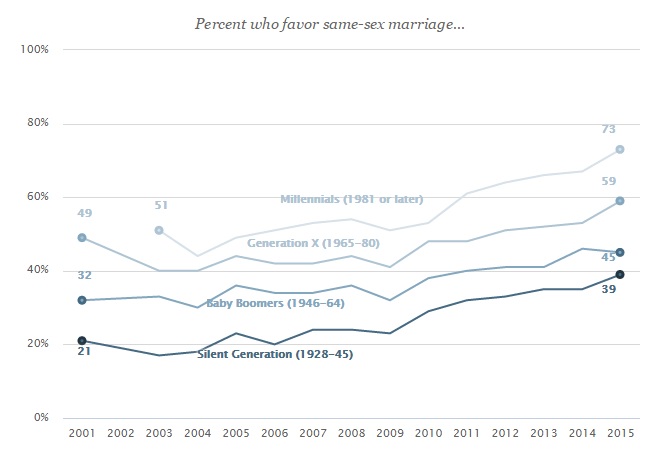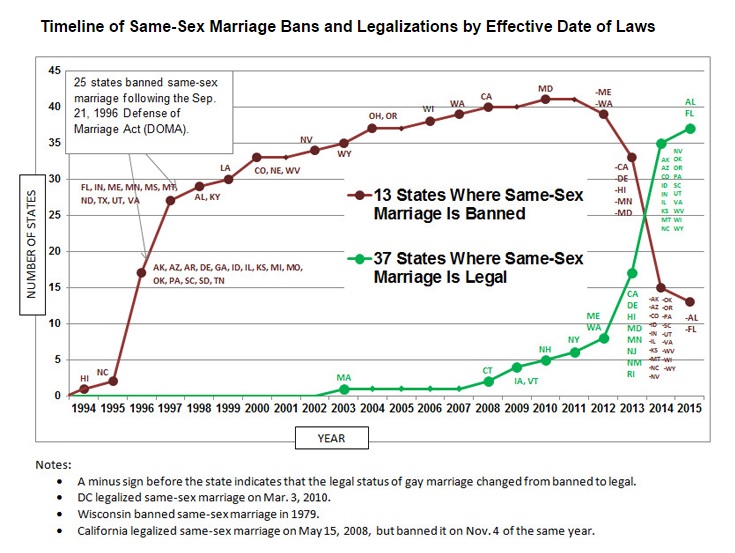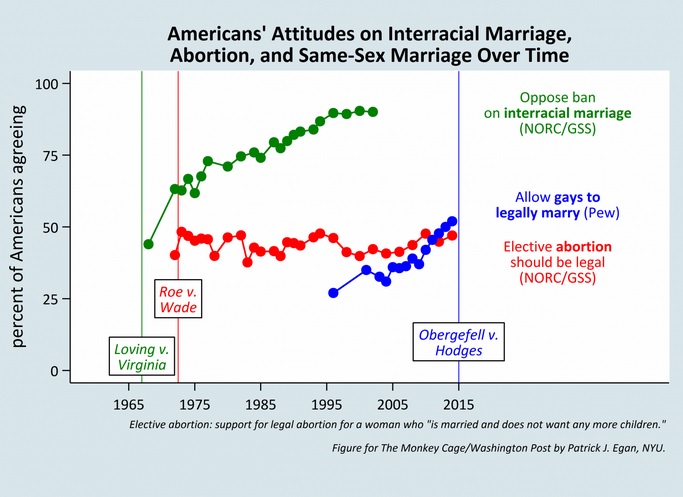Here's Where Chief Justice Roberts' Logic on Marriage Equality Is Surprisingly Flawed
By:
In his 29-page dissent to the U.S. Supreme Court's historic marriage decision Friday, Chief Justice John Roberts asked his colleagues "Just who do we think we are?"
The high court's decision legalized marriage for same-sex couples across the country, and in his scathing rebuttal to the majority opinion, which he read out loud from the bench for the first time, Roberts starkly condemns the high court's ruling by making two bold, interconnected claims. He writes that the court's decision completely undermines the democratic process while flying in the face of the Constitution, which he believes has no precedent for extending marriage to same-sex couples.
Per Roberts:
"[T]his Court is not a legislature. Whether same-sex marriage is a good idea should be of no concern to us. Under the Constitution, judges have power to say what the law is, not what it should be. [...] Supporters of same-sex marriage have achieved considerable success persuading their fellow citizens—through the democratic process—to adopt their view. That ends today. Five lawyers have closed the debate and enacted their own vision of marriage as a matter of constitutional law. [...] [B]y all means celebrate today's decision. Celebrate the achievement of a desired goal. [...] But do not celebrate the Constitution. It had nothing to do with it."
(Please tell us how you really feel, Chief Justice Roberts.)
Roberts' legal argument should not concern us. For anyone engaged in the sport of 'SCOTUS watching' -- which I consider something like following the British royal family but with more Talking Points Memo and less US Weekly -- Roberts' dissent was unsurprising. What shocked many was his assertion that supporters of marriage equality "lost, and lost forever" the hearts of the American people, that "true acceptance" is now permanently beyond the grasp of marriage equality advocates.
His full words:
"Indeed, however heartened the proponents of same-sex marriage might be on this day, it is worth acknowledging what they have lost, and lost forever: the opportunity to win the true acceptance that comes from persuading their fellow citizens of the justice of their cause. And they lose this just when the winds of change were freshening at their backs."
Could Chief Justice Roberts be right?
If Roberts statement was true, equality-minded people should be concerned. The court's ruling Friday could be the turning point for a movement that had finally gained real traction in the hearts and minds of many Americans. Instead of a moment to pause for celebration, it might mark a hardening of public opinion against the families of friends and neighbors.
Luckily, the chief justice's claims only show that he's out of touch with the American public. (Although not as out of touch as Antonin "ask a hippie" Scalia.) Prior to the majority's decision, support for marriage equality was at an all time high. And this ground swell of positivity has only increased over time.
Polls showed strong support for marriage equality prior to June 26
In at least nine major national polls conducted between April and June of 2015, a majority of Americans favored the legal right of same-sex couples to marry. Compared with support over the past decade, that is a significant shift. Pew Research Center shows almost 60 percent of Americans sided with marriage equality in May 2015. Asked the same question in April 2009, a mere 35 percent thought same-sex couples should be allowed to legally marry. That is a 22-point shift in six, short years.
Other long-running national polls report similar results -- such as Gallup, which showed 60 percent support for marriage equality in May 2015, an increase of 20-points from the 40 percent approval that researchers found in 2009. These are not isolated numbers, even among different generations.
 Pew Research Center - pewforum.org
Pew Research Center - pewforum.org
Beyond widespread support for marriage equality, a majority of Americans already believed that SCOTUS would legalize same-sex marriage in their ruling anyway, according to polling conducted prior to the actual decision. This could be taken solely as a measure of what respondents thought the high court's opinion would be, representing inevitability rather than actual approval. Except that pollsters also asked survey takers if they would "favor or oppose" the Supreme Court deciding "that gays have a constitutional right to marry." Almost two-in-three Americans (57 percent) approved of the the court taking such an action in early June.
(Variations on this theme came up in numerous polls. One poll suggested that most Americans hoped that SCOTUS would rule on the issue and create one standard for all states. Another poll demonstrated that much of the populace believed that marriage was a constitutional right guaranteed to everyone regardless of sexual orientation.)
Decisions of 'the People' vs. decisions of the court
The other claim that Roberts' argument rests on is that same-sex marriage legalization has largely been accomplished by the legislative process. That is simply not true because almost three-quarters of the states had already opened marriage to same-sex couples prior to Jun. 26, with 26 of those states deeming same-sex marriage was legal by court decision. In all of these cases, marriage equality decisions came about not via a majority vote of the people or even via the legislative process, but through court decisions -- court decisions not unlike the ruling just issued by the U.S. Supreme Court.
Only three states (Maine, Maryland and Washington state) ratified same-sex marriage by popular vote. These must be the "considerable success" that Roberts references in his dissent when he discusses marriage equality victories that came from gays and lesbians "persuading their fellow citizens [...] to adopt their views."
Eight more states legalized same-sex marriage via their own legislatures. Although not a direct vote, this still could meet Roberts' litmus for democratic process.
 ProCon.org - procon.org
ProCon.org - procon.org
Did SCOTUS' decision cause Americans to change their minds?
Whether Americans already supported marriage equality or not -- and a majority did -- there is no precedent from other divisive social issues to suggest that the high court's decision will make same-sex couples' marriages "that much more difficult to accept." Loving v. Virginia did not upset trends toward increasing support of interracial marriage; in fact, it set off a rise in approval where little existed when SCOTUS issued its historic 1967 decision. Although Americans' attitudes changed toward same-sex marriage, the public opinion on abortion did not see a drop in public opinion since legalization -- just periods of stagnation in growing support.
 Washington Post - washingtonpost.com
Washington Post - washingtonpost.com
Roberts dissent belies the facts. But perhaps we have an answer to his original question, "Just who do we think we are?"
As the U.S. Supreme Court stands with the 70 percent of states that already legalized same-sex marriage via similar judicial decision, Justice Anthony Kennedy spoke to the dissent:
"The dynamic of our constitutional system is that individuals need not await legislative action before asserting a fundamental right. The Nation’s courts are open to injured individuals who come to them to vindicate their own direct, personal stake in our basic charter. An individual can invoke a right to constitutional protection when he or she is harmed, even if the broader public disagrees and even if the legislature refuses to act."
Time will tell. It looks like the ending is pretty sweet so far.
